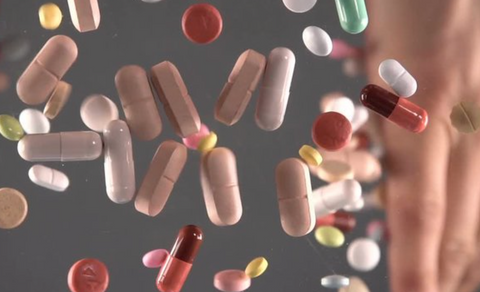Pregnant? Here's what you need to know about Collagen...
So, you're pregnant! Congratulations! Whether you fell pregnant at the drop of a hat, or struggled for years to make it happen, regardless of your individual journey, pregnant women only have one thing on their mind during this time, how can i keep my baby, and myself, healthy and thriving during the most magical, challenging and transformative years of your life, emotionally, physically and spiritually.
While the female body is designed for pregnancy, there's no argument that growing and carrying a baby can be very tough physically for most women. Alongside hormonal changes, the body must stretch and expand in extraordinary ways. We associate pregnancy with stretch marks and skin elasticity, but deeper layers such as fascia, ligaments, and muscles are all affected as the body changes.
One question we have been asked for years: ''Is collagen safe during pregnancy and breastfeeding?''. The answer is YES! - our special pregnancy and breastfeeding safe formula, GLOW Youth Elixir, is safe and essential and has helped thousands of pregnant women have an incredibly healthy pregnancy journey.
Just because you can no longer rely on botox to reduce the wrinkles (ouch), or lasers or infra-red saunas to reduce the bloat, does not mean your self care regime needs to suffer. Our beautiful bespoke formulas, partnered with our free skin and gut healing guide, can do all of the above, and then some.
Hello pregnancy GLOW! ✨
Let's talk about why more pregnant women are using these natural, holistic Australian supplements, to level up their pregnancy game.

1. HORMONES
Hormones ramp up during pregnancy, which can lead to skin pigmentation in about 3 in 4 women, and these hormonal changes can also exacerbate acne. The unique hydrolysed, multifunctional 3kD se collagen peptides, are what we call a smart supplement, because it targets health and aging, from the inside, and out.
Some of the most enjoyable and reported benefits from our pregnant customers are that they feel far more stable and regulated, they feel an energy boost, which is due to the unique and potent amino acid composition, which is 95% pure, bio-active protein, AND they notice their skin looks and feels more hydrated, plump, clear and firm.








HOW DOES IT WORK?
THE PLACENTA
The placenta is not the barrier that we once thought – over 287 chemicals have been found in the umbilical cords of babies, associated with chemicals being used by mum either in her personal care or household cleaning products. Women can use an average of 168 chemicals including reproductive and developmental toxins – they are found in the average of 12 personal care products women use daily.
Toxins that we've deemed as "acceptable" in our modern, high tech lives, many that are found in our common beauty and personal care products, have been linked to pre-term birth, low birth weight, developmental delays and altered gene expression. This is just what we KNOW of – many of the toxins have not been necessarily been tested on pregnant women for good reason, we are only scratching the surface and seeing the ramifications of the industrial, chemical and technological revolutions. With an increased rate of autism, allergies and asthma in newborns and children, it makes sense to start looking more closely at what we are putting on and IN our bodies. Starting from the day we are born.

WHAT TO AVOID
1. PARABENS
Parabens are used in beauty products as a preservative; they extend the shelf life of products. When it comes to pregnancy, studies have reported parabens are capable of crossing the placenta, infiltrating breast milk, and disrupting the growth of fetuses. Look for paraben free skincare.
2. PERFUMES
Most synthetic fragrances on the market use chemical fixatives such as phthalates to make scents adhere, lift and linger in the air. Phthalates, unfortunately, have been found in studies to disrupt hormones, contribute to infertility and inhibit fetal development, which is why pregnant and nursing women are advised to avoid synthetic fragrances. I personally don't use synthetic fragrances... ever!
3. RETINOIDS / RETINOL
Retinoids can be sold over-the-counter in a weaker form called retinol, retinyl linoleate or retinyl palmitate. Physicians also prescribe topical retinoids such as tretinoin, tazarotene and adapelene, which are more potent. These substances work by penetrating your skin, stimulating your cells to divide more quickly and encouraging the growth of collagen, and elastic fiber in your skin.This is because high dosages of vitamin A can affect an unborn child, potentially leading to birth defects, according to BabyCente. If you currently use these medications, talk to your physician about your skin conditions and health during pregnancy.
4. SALICYLIC ACID & BHAs
Look for skincare with less than 2% salicylic acid and avoid synthetic peels which may contain BHAs which leave the skin sensitive to UV exposure, in particular during pregnancy. Salicylic used in high doses have been shown to cause birth defects and pregnancy complications.
5. SYNTHETIC COLOURANTS
Mostly found in lipsticks and eye shadows are often are a source of lead. Over 60% of lipsticks contain lead which has been linked to miscarriage and reduced fertility. Lead has also been found in cosmetics such as foundation and toothpaste.
6. TOULENE
Found in nail polishes along with phthalates and formaldehyde. Proven carcinogens which cause reproductive and fetal development toxicity in animal studies. These are toxins that you want to avoid at all times, especially during pregnancy.
7. ESSENTIAL OILS
Some essential oils are highly concentrated and need to be used with care. Avoid oils such as tea tree, rosemary, jasmine, clary sage. Essential oils such as sweet orange, ginger, grapefruit and spearmint are generally safe when used diluted externally. The thing with essential oils is there is a lack of research on whether they are safe to use during pregnancy or not, so they are best avoided during the first trimester.

8. "DIET' COLLAGEN SHAKES & SYNTHETIC SUPPLEMENTS
ALWAYS read the ingredients list, and if your product doesn't have one, reach out to the manufacturer. Many "health" products on the market today, have been watered down to boost profit margins. Manufacturers do this by adding gums, thickeners, sweeteners, colours, flavours, cheap fillers like rice, pea, sugar, dairy, and gluten based powders. Another trick in the collagen industry, is advertising collagen, but trying to hide the fact it is from Bovine, a sub-standard type, which doesn't contain a therapeutic amount of Type 1 collagen.

Essentially, with these types of supplements, you're getting less of the active ingredients, so you're flushing money down the toilet. Nothing infuriates us more than misleading marketing and clever advertising ploys that the industry is rife with. This is also another reason why we formulated our own supplements, because when we were trying to find a cure for Lee's brain cancer, we discovered that there was just so much rubbish on the market, so we wanted to fill the gap, and provide natural, holistic, effective and bio-active alternatives to the synthetics on our health store and pharmacy shelves.
It's also a good rule of thumb to steer clear of supplements in synthetic tablet form, the nutrients are usually so compromised, and in such a small dose that they have a minimal effect, and much of the time, these synthetic tablets do more harm, than good. These are cheap to manufacture, and again are made to boost profits, not your health.

NATURAL PREGNANCY
In closing, keep your pregnancy skin care routine as simple as possible. Products that contain a huge list of ingredients aren't necessarily any better than ones that are simple. If you can't pronounce the ingredient name on the label, then you probably shouldn't be using it. Green beauty is best.
If you're looking for an organic, raw and live pregnancy multi-vitamin, our DETOX Life Elixir provides all the essential nutrients for a healthy mum and growing bub. Packed with vitamins, minerals, digestive enzymes, minerals, probiotics, essential fatty acids, amino acids, and antioxidants, it is a powerhouse of a superfood, known as the most nutrient dense on the market, and it's naturally produced by nature, not a lab! It's also the only plant source of Vitamin B12 and contains more protein than red meat.
YOUR BODY, YOUR CHOICE
We would like to leave you with a gentle reminder that only YOU know what is best for your baby and YOUR body. What is unsafe for one pregnant woman, may be completely fine for the next. Take all the well intended advice with a grain of salt, using what works for you, and discarding what doesn't.
Look after yourself, Mama. Growing a little human is the most precious gift anyone can ever receive. Wishing you all the best in your motherhood journey!

**As with any supplement during pregnancy and lactation, we recommend you run it past your midwife or GP first.
If you have any questions or need any guidance, please don't hesitate to email the team: hello@edibleearth.com.au or slide into our DM's at @__edible_earth 💚



